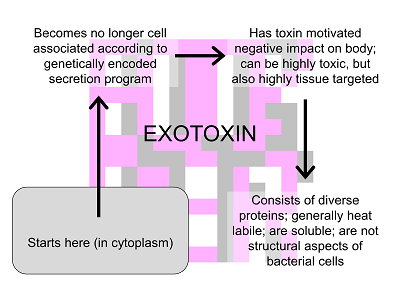∞ generated and posted on 2016.02.20 ∞
Protein substance produced by bacteria which in a soluble form causes specific and often severe damaging impacts on especially eukaryotic cells and organisms.
| Exotoxins are protein-based toxins that are produced and released by bacteria and which act against the organism that the bacterium is infecting. |
Here "soluble" means separated from the bacterial cell that produces it. That is, in a sense, "" from the bacterial cell itself.
Exotoxins supply this "action at a distance" because they are intentionally released from the bacterial cell. Nonetheless, they are produced initially within the bacterial cell and then must either be secreted or the cell itself must to release these proteins.

Figure legend: Flowchart (of sorts) indicating the various properties of exotoxins – which above all are highly diverse – and particularly in terms of what differentiates them from endotoxins.
There are various categories of exotoxins including , , and . More specific examples of exotoxins include botulinum toxin, coagulase, collagenase, erythrogenic toxin, hyaluronidase, leukocidins, Leukocidins, staphylococcal enterotoxin, tetanus toxin, and vibrio enterotoxin.
Contrast with endotoxin and see also toxin (bacterial) as well as a-b toxin, antitoxin, and superantigen.
The following video provides a brief introduction to A-B toxins, though sound fades out towards the end: